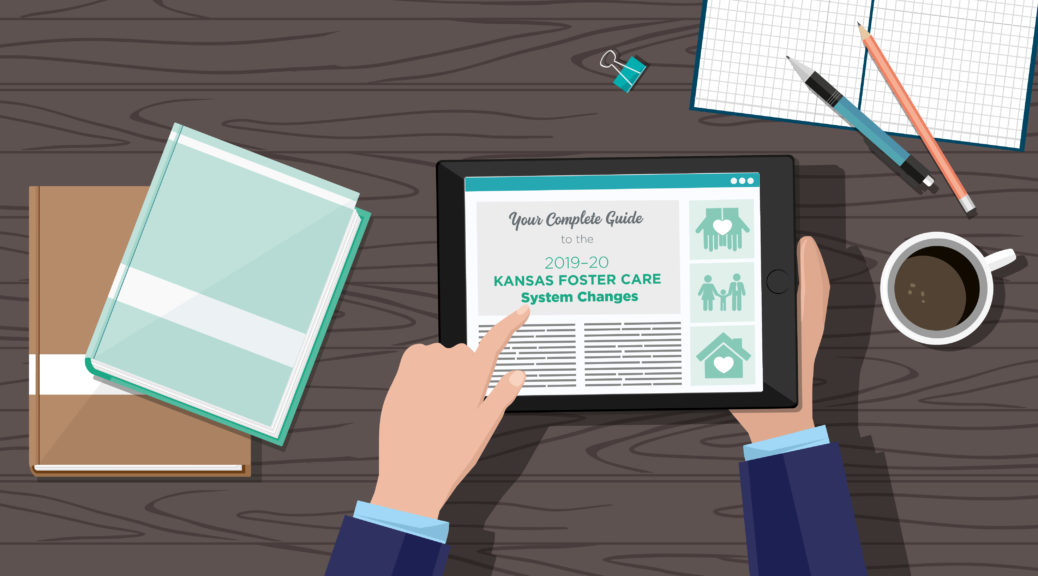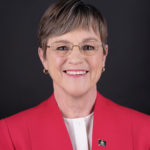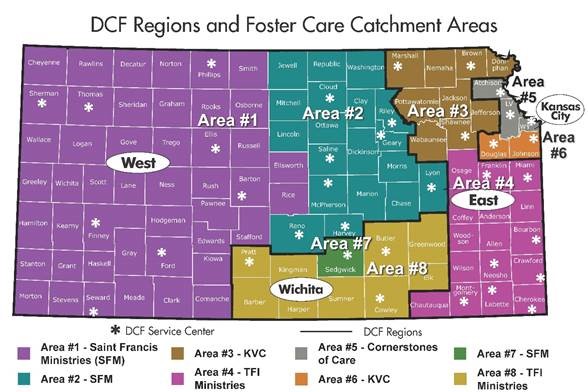Your Complete Guide to the 2019-20 Kansas Foster Care System Changes

This year, the Kansas child welfare system is going through several changes in order to better serve children and families in need. This article is intended to break down all these changes and show you the positive direction we’re moving in to improve people’s lives. The changes can be thought of in a few broad categories: leadership, direction and service providers.
While KVC Kansas is a private, nonprofit organization and does not speak for the state, we put together this article to share information and answer questions. We want to make sure everyone — youth, families served by the child welfare system, legislators, judges, attorneys, child welfare professionals, foster families, volunteers, advocates and others — understand what’s changing and why. After all, thousands of children and families are depending on us to work together and provide the best possible support!
Subscribe to Our Blog for More Updates Like This!
Kansas Child Welfare Leadership Changes

Gov. Kelly
The first major change impacting the Kansas foster care system is leadership. In November 2018, Kansans elected a new governor to lead the state. Governor Laura Kelly took office in January 2019. As a member of the Kansas Senate for 15 years, Gov. Kelly has been closely involved with the child welfare system and has spoken frequently about it. She was a member of the state legislature’s Child Welfare System Task Force that studied the system and made specific recommendations of how to strengthen it.
We at KVC Kansas have also been vocal about the challenges facing the child welfare system and recommended solutions. In this infographic, we identified the root cause of the child welfare system challenges as the 45% increase in Kansas children in foster care. Many of the recommendations that we put forward in that infographic have now been enacted, thanks to hard work and advocacy. Some of those recommendations including expanding the pool of professionals eligible to work in child welfare so there is greater quality and stability within the workforce and expanding efforts to safely prevent foster care.

Sec. Howard
Even before Gov. Kelly was sworn in, she made a significant leadership change that affects both child welfare and mental health across Kansas. She appointed Laura Howard to be Interim Secretary over both the Kansas Department for Children and Families (DCF) and the Kansas Department for Aging and Disability Services (KDADS). On April 1, the Kansas Senate confirmed her appointment. Secretary Howard’s experience includes more than 30 years of government and human service work. She previously worked as a special assistant, deputy secretary and chief of staff for the former Kansas Department of Social and Rehabilitation Services (which is the previous name of DCF). She also served as regional administrator for Region VII of the Substance Abuse and Mental Health Services Administration (SAMHSA) within the U.S. Department of Health and Human Services. Most recently she served as the Director of the KU Public Management Center.
Sec. Laura Howard appointed a few leaders to key positions and began working on her priorities for strengthening children and families.
The Positive Direction We’re Headed
Gov. Kelly and Sec. Howard have frequently shown their support for strengthening the child welfare system, mainly by implementing programs that have proven to prevent the need for foster care and keep Kansas families strong. On April 18, Gov. Kelly signed a bill increasing funding of child welfare services in Kansas. This move injects millions of dollars into Kansas programs that strengthen vulnerable children and families. This bill aligns state requirements with the federal Family First Prevention Services Act (FFPSA), a national reform that adds significant funding for safely preventing foster care.
“This legislation will help to rebuild the Department for Children and Families and provide critical funding for programs aimed at strengthening families and keeping children safe,” said Kelly. House Bill 2103 allows for an enhanced federal match rate for certain child welfare system evidence-based prevention services and programs beginning October 1, 2019.
“The Department for Children and Families has already begun to connect with community partners across the state to kick off our Family First initiatives,” said DCF Secretary Laura Howard. “The additional federal funds along with these valued partnerships will allow us to introduce evidence-based practices throughout the state that will keep families together and children safe.”

Bass
As our President Dr. Linda Bass recently shared in a letter to the Topeka Capital Journal, the best way to help children is to safely prevent foster care. Foster care is an important intervention that is sometimes needed to keep a child safe from abuse or neglect, but it should be a last resort after all options for safely supporting a family in their own home are exhausted.
While prevention is best for kids and families when possible because it avoids traumatic family separations, it’s also cost-effective. High quality prevention services cost on average $5,000-10,000 per family compared to $78,000 per family for one year of foster care (assuming three children average). The cost savings and improved outcomes related to prevention services are clear.
At KVC Kansas, we are pleased to see state leaders focus on prevention. Funding for mental health services, substance use treatment, and parenting skill-building will keep more children safely at home.
Changes in Kansas Foster Care Providers
That leads one final category of change: the providers, or nonprofit organizations, that provide foster care and related services on behalf of the state. This topic can be especially confusing.
First, it’s important to know that Kansas has three main categories of services that it relies on private, nonprofit organizations to provide. Those are:
- Family Preservation – This is in-home support for vulnerable families to safely prevent foster care. There are four family preservation contracts covering four regions of the state. KVC Kansas has been serving half of the state with prevention services for the past six years.
- Foster Care Case Management, Reunification & Adoption – Kansas is unique in that it uses private partners to handle case management for children in foster care. As the only organization that has provided these services for 23 years consecutively, we at KVC Kansas can share that this approach helped make Kansas a national leader in child welfare outcomes. Currently, there are four available contracts covering four regions of the state, but that is changing to eight contracts for eight areas. The case management contract is for providing support to children in foster care and their families. It does not include responsibility for recruiting, licensing and support foster families (more on that below).
- Adoption Exchange – The state also contracts with nonprofit organizations to maintain AdoptKSKids.org, the database of children who need loving adoptive families.
Now that you understand how the state structures the contracts for these services, here is the latest update on who the providers are:
Family Preservation
In September 2019, DCF announced the providers for family preservation in Kansas. As a result, KVC Kansas will continue to serve clients through December 2020. View the image below to see the new catchment areas, and click here for more information.
Foster Care Case Management, Reunification & Adoption
While DCF did cancel and rebid its family preservation grants, it is moving forward with the foster care case management contracts that the previous administration announced.
The entire child welfare system is working toward an important October 1, 2019 for these new foster care case management contracts to begin. This requires significant administrative work in terms of hiring and transitioning staff, moving or opening offices, transitioning case files, and of course communicating the changes to all stakeholders. At KVC Kansas, our goal is for the transition to be as seamless as possible for the benefit of children and families.
The providers as of October 1 will be:
- Area 1 (Western KS)—Saint Francis Ministries (no change)
- Area 2 (North Central KS)—Saint Francis Ministries (no change)
- Area 3 (Topeka & North) —KVC Kansas (no change)
- Area 4 (Southeastern KS) —Changing from KVC Kansas to TFI Family Services
- Area 5 (Kansas City, KS Area)—Changing from KVC Kansas to Cornerstones of Care
- Area 6 (Olathe & Lawrence Areas) —KVC Kansas (no change)
- Area 7 (Wichita Area) —Saint Francis Ministries (no change)
- Area 8 (South Central KS)—Changing from Saint Francis Ministries to TFI Family Services
You can view each of the four providers’ websites here: Saint Francis Ministries, KVC Kansas, TFI Family Services, and Cornerstones of Care.
Here’s a map of the areas and providers:
There’s one more contract that’s new and will support the foster care case management work. In 2018, DCF issued a bidding opportunity for a new software system which will contain all of the available foster homes in Kansas. The goal is to place children with the best match of a foster family, ideally in the child’s school district and home community.
DCF awarded its Placement Matching System contract to Five Point Technology Group based in Florida. Configuration began several months ago, testing will begin in July, and training for child welfare staff begins in August. Effective October 1, 2019, all of the case management providers and the child placing agencies who support foster families will begin actively using the system.
Beginning in 2001, KVC also developed and continually enhances its own sophisticated software that does this called Matching Families. KVC has a robust software development team and other technology innovation which you can read about here.
Adoption Exchange
The Kansas Children’s Service League (KCSL) is currently the provider of the state’s adoption exchange, AdoptKSKids.org. This is not expected to change until the DCF begins a new adoption exchange contract bidding process.
Because KVC Kansas is responsible for so many children in foster care who urgently need adoptive families, we also maintain a KVC adoption website here. We frequently share photos of videos of children on our social media accounts including the KVC Kansas Facebook page and our @KVCkids Instagram profile.
That leaves one important service to mention:
Foster Family Training & Support
This is perhaps the most confusing aspect of the Kansas child welfare system. Responsibility for children in foster care (case management contractor) and responsibility for foster families (what’s called a Child Placing Agency or CPA) are two separate roles. A child in foster care may be served by the same nonprofit for both functions, but there is no requirement or link between the two.
There are many child placing agencies in Kansas beyond the providers listed above. KVC Kansas is a licensed child placing agency. In fact, about one-third of all foster families in the state are KVC Kansas foster parents. You can learn more about becoming a Kansas foster parent here.
The biggest misconception we hear about the 2019-20 Kansas child welfare system changes is that foster families think they must change the agency that supports them to the new foster care case management provider in their area. This is not true. Foster family support is not based on state contracts, so foster families can stay with the agency that provides them the best support. KVC Kansas will continue to recruit, train and support foster families across the entire state of Kansas.
That Covers the Big Changes
Wow, that was a lot of information! It’s very likely that you still have questions about how the changes impact you specifically. If you do, we would love to help answer them. Please contact us today by using this form, emailing kansas@kvc.org, or calling us at (913) 499-8100.
While there are many moving parts in the Kansas child welfare system during 2019-20, the end goal hasn’t changed. It’s still to strengthen Kansas children and families, and hopefully to focus on safely preventing foster care so we can keep more children safely at home with their families.
We need everyone to play a role in strengthening children and families. Get inspired to help and advocate for others by watching these family success stories. You can also provide temporary care for a child in need, become a child’s permanent family through adoption, donate online, or browse open positions on the KVC team. Thank you for caring about children and families in our state!


